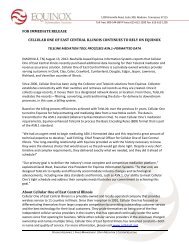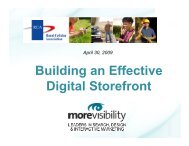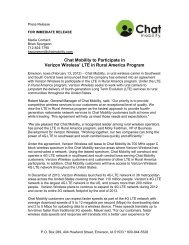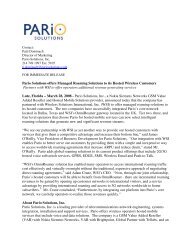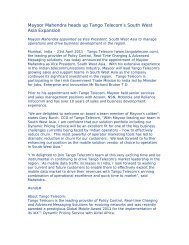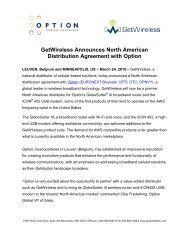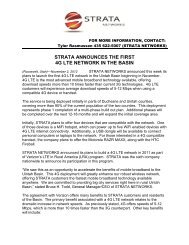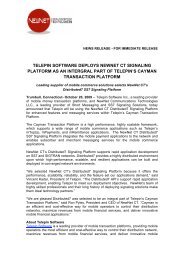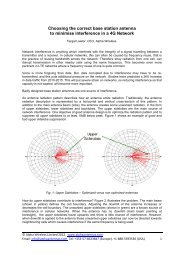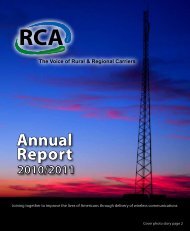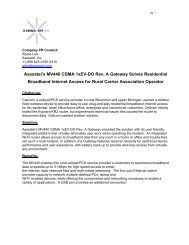Details - Competitive Carriers Association
Details - Competitive Carriers Association
Details - Competitive Carriers Association
You also want an ePaper? Increase the reach of your titles
YUMPU automatically turns print PDFs into web optimized ePapers that Google loves.
The Washington<br />
Monitor<br />
Volume XVI, No. 8<br />
June 30, 2008<br />
Part 1: Update on Activities in Congress by Capitol Decisions, Inc.:<br />
HOUSE HOLDS HEARING ON USF<br />
The Energy and Commerce Subcommittee on Telecom and the Internet held a<br />
hearing on USF today that focused mostly on the need to improve access to broadband<br />
services to revolutionize the educational and healthcare systems of America.<br />
The Chairman of the subcommittee, Ed Markey (D-MA), urged in his opening<br />
remarks that the debate at the hearing should not focus on who will receive a “divvied-up<br />
pool of funds” but rather on whether the program was meeting its goals of providing<br />
universal service. The witness list mirrored that objective in that no carriers or carrier<br />
organizations were invited to participate. Witnesses included, Rey Ramsey, Chief<br />
Executive Officer, One Economy, George Lucas, Chairman, The George Lucas<br />
Educational Foundation, Charles Sullivan, Executive Director, International C.U.R.E.<br />
(Citizens United for Rehabilitation of Errants), Jane Smith Patterson, Executive Director,<br />
The E-NC Authority and Randolph May, The Free State Foundation.<br />
The Chairman of the full committee, John Dingell (DMI), made a brief<br />
appearance, calling the USF “a fundamental American value [that is] about consumers,<br />
not carriers.” He also stated support should be properly targeted to ensure fairness.<br />
Randy May of the Free State Foundation, a free market oriented think tank that<br />
limits government involvement, stated USF reform should include four elements: cap the<br />
entire fund, permit competition to control fund growth, target USF support to unserved<br />
areas and fund the program through appropriations from the general treasury.<br />
Congressmen Bart Stupak (D-MI) and Chip Pickering (R-MS) echoed support for May’s<br />
suggestion to target funds.<br />
Another witness that echoed support for the wireless industry was George Lucas<br />
of Star Wars fame. Although he presented testimony on the E-rate program, he took time<br />
to say that wireless technology was the “new printing press of the future.” He expressed<br />
dismay at the lack wireless access in remote areas of Wyoming when “in Africa, they’re<br />
using cell phones to do their school work.” While he acknowledged it was Congress’ job<br />
to come up with the solution for USF reform, he criticized the inefficiencies of the<br />
current system saying that instead of collecting money to then disburse it for build-out in
The Washington Monitor<br />
Page 2<br />
remote areas the government should assign spectrum for free use for schools and<br />
libraries.<br />
Jane Patterson of E-NC, a state based broadband deployment program, supported<br />
continued USF funding to lay fiber. Rey Ramsey focused his comments on the need to<br />
expand broadband services to low income and unserved populations while Charlie<br />
Sullivan of C.U.R.E. called for an end to commissions paid on phone calls placed by<br />
prisoners.<br />
Chairman Markey concluded the hearing with no further announcements.<br />
Part 2: Update on FCC Developments by RCA Counsel:<br />
FCC PROPOSES RULE CHANGES FOR ADVANCED WIRELESS SERVICES<br />
(AWS) SPECTRUM IN THE 1.9 AND 2.1 GHz BANDS<br />
AWS-3 Band Licensee Would Be Required to Support<br />
Public Access to Free, High-Speed Broadband Internet Services<br />
The Commission seeks comment on proposed rules for the Advanced Wireless<br />
Services (AWS) spectrum in the 1915-1920 MHz, 1995-2000 MHz, and 2155-2180 MHz<br />
bands. In 2004, the FCC sought comment on service rules for the 1915-1920 MHz, 1995-<br />
2000 MHz, 2020-2025 MHz, and 2175-2180 MHz bands (“AWS-2”), and in 2007, the FCC<br />
sought comment on service rules for the 2155-2175 MHz band (“AWS-3”). To supplement<br />
comments received in response to these earlier notices, comments are requested on specific<br />
service rules for these spectrum bands.<br />
Specifically, proposed rules for the 2155-2180 MHz band (AWS-3 band) include:<br />
‣ Combine the 2155-2175 MHz band with the 2175-2180 MHz band in order to<br />
create a 25 megahertz block of spectrum.<br />
‣ Permit downlink and uplink transmissions throughout the entire 2155-2180 MHz<br />
band.<br />
‣ Adopt a single nationwide license for the 2155-2180 MHz band.<br />
‣ Adopt open eligibility for the 2155-2180 MHz band.<br />
‣ Require the licensee to provide free, two-way broadband Internet service<br />
including:<br />
o engineered data rates of at least 768 kbps downstream using up to 25<br />
percent of the licensee’s wireless network capacity.
The Washington Monitor<br />
Page 3<br />
o an “always on” network-based filtering mechanism.<br />
‣ Require the licensee to provide for open devices and open applications for its<br />
premium service and open devices for its free service.<br />
‣ Provide an initial license term of ten years and subsequent renewal terms of ten<br />
years.<br />
‣ Require the licensee to provide signal coverage and offer service to: 1) at least 50<br />
percent of the total population of the nation within four years of commencement<br />
of the license term and 2) at least 95 percent of the total population of the nation<br />
at the end of the 10-year license term.<br />
‣ Allow licensees to disaggregate, partition, and lease the spectrum.<br />
‣ Provide that mutually exclusive applications should be resolved through<br />
competitive bidding.<br />
‣ Require AWS-3 mobiles to attenuate out-of-band emissions (OOBE) by 60 +<br />
10log (P) dB outside of the AWS-3 band, and establish a power limit for AWS-3<br />
mobile devices of 23 dBm/MHz equivalent isotropically radiated power (EIRP).<br />
‣ Require an OOBE limit of 43 + 10 log (P) dB for AWS-3 base and fixed<br />
downlink stations and a power limit of 1640 watts peak EIRP in non-rural areas<br />
and 3280 watts peak EIRP in rural areas.<br />
Proposed rules for the 1915-1920 MHz and 1995-2000 MHz bands (H Block)<br />
include:<br />
‣ License the H Block using exclusive geographic area licensing on a Basic<br />
Trading Area (BTA) basis.<br />
‣ Adopt open eligibility for the H Block.<br />
‣ Provide an initial license term of ten years and subsequent renewal terms of ten<br />
years.<br />
‣ Require an H Block licensee to provide signal coverage and offer service to: 1) at<br />
least 35 percent of the population in each licensed area within four years and 2)<br />
at least 70 percent of the population in each licensed area at the end of the license<br />
term.<br />
‣ Allow licensees to disaggregate, partition, and lease the spectrum.<br />
‣ Provide that mutually exclusive applications should be resolved through<br />
competitive bidding.<br />
‣ Require H Block licensees in the 1915-1920 MHz band to pay a pro rata share of<br />
expenses previously incurred by UTAM Inc. in clearing that band.<br />
‣ Adopt both relocation requirements for H Block entrants in the 1995-2000 MHz<br />
band and procedures for cost-sharing among other new entrants in the Broadcast<br />
Auxiliary Service band, including Sprint Nextel and Mobile Satellite Service<br />
entrants.
The Washington Monitor<br />
Page 4<br />
‣ Prohibit base and fixed transmission in the 1915-1920 MHz band.<br />
‣ Require mobiles at 1915-1920 MHz to attenuate OOBE by 90 + 10log P dB<br />
within the PCS band (1930-1990 MHz band), and establish a power limit for<br />
mobiles of 23 dBm/MHz EIRP.<br />
‣ Prohibit mobile transmission in the 1995-2000 MHz band.<br />
‣ Adopt an OOBE limit of 43 + 10 log (P) dB for base and fixed stations at 1995-<br />
2000 MHz and a power limit of 1640 watts peak EIRP in non-rural areas and<br />
3280 watts peak EIRP in rural areas.<br />
Comments will be due fourteen days following publication in the Federal Register,<br />
with reply comments due twenty-one days following publication in the Federal Register.<br />
Further Notice of Proposed Rulemaking, WT Docket Nos. 07-195 and 04-356, FCC 08-158,<br />
released June 20, 2008.<br />
FCC PROVIDES PUBLIC NOTICE OF THE<br />
PROPOSED ACQUISITION OF ALLTEL BY VERIZON WIRELESS<br />
The FCC has issued a Public Notice of applications for consent to the acquisition of<br />
ALLTEL by Verizon Wireless. When the FCC and Justice Department eventually act on the<br />
proposal the parties may be subject to certain terms and conditions, and will likely be<br />
required to divest certain spectrum licenses and business units where the agencies find that<br />
competition would be severely impacted by the merger.<br />
Interested parties may file petitions to deny no later than July 25, 2008. Issues that<br />
could be raised include foreign ownership by Vodafone Group, Plc (an English public<br />
limited company), spectrum aggregation in certain markets, automatic voice/data roaming<br />
agreements where networks are technically compatible, and exclusive agreements for<br />
handsets. Oppositions to such pleadings must be filed no later than August 4, 2008. Replies<br />
to such pleadings must be filed no later than August 11, 2008. Public Notice, DA 08-1481,<br />
released June 25, 2008.<br />
RCA URGES FCC TO MAINTAIN NATIONWIDE 700 MHz D BLOCK LICENSE<br />
AND LIMIT ELIGIBILITY OF BIDDERS<br />
RCA submitted comments in support of the establishment of a mandatory<br />
public/private partnership in the upper portions of the 698-806 MHz band (D-Block) as the<br />
best means to facilitate the construction and deployment of a much-needed public safety<br />
network. A nationwide D-Block license will simplify the Commission’s oversight<br />
obligations that follow grant of the spectrum license and will allow the winning D-Block<br />
licensee and the Public Safety Spectrum Trust (“PSST”) to focus their collective efforts on<br />
ensuring the timely completion of an advanced telecommunications network that serves the<br />
commercial interests of the D-Block licensee and the nation’s public safety and homeland<br />
security needs.
The Washington Monitor<br />
Page 5<br />
RCA encouraged the Commission to limit D-Block bidding eligibility to entities that<br />
do not already have nationwide or near-nationwide 700 MHz spectrum holdings. In the<br />
recently concluded 700 MHz auction, Verizon Wireless and AT&T accounted for about 84%<br />
of the approximately $19 billion in net winning bids. Sound spectrum policy dictates that the<br />
Commission make this final allotment of nationwide 700 MHz spectrum available only to<br />
entities other than Verizon Wireless and AT&T. A third nationwide carrier on 700 MHz will<br />
offer a needed choice for the public and will increase from two to three the number of<br />
potential roaming partners for small and mid-sized rural wireless carriers that depend on<br />
roaming agreements to serve customers who travel outside of their regional rural wireless<br />
carrier networks.<br />
RCA OPPOSES FCC PROPOSAL TO EXPAND<br />
ETC DTV NOTIFICATION REQUIREMENTS<br />
RCA submitted comments in opposition to the FCC’s proposal to require Eligible<br />
Telecommunications <strong>Carriers</strong> (“ETCs”) to provide to all of their subscribers monthly notices<br />
about the digital television (“DTV”) transition. ETCs already provide required monthly DTV<br />
notices to Lifeline and Link-Up customers. RCA’s position is that the Commission has failed<br />
to adequately justify the need to expand the recipient pool of the ETC DTV transition<br />
notification, and that the costs to provide monthly notices to all subscribers would far<br />
outweigh the benefits. Lifeline/Link-Up compliance costs for multiple RCA members<br />
already range from $300,000 to more than $1 million, including all printing, mailing and call<br />
center costs. Expanding the recipient pool for DTV transition notices to all of an ETC’s<br />
customers would cost exponentially more.<br />
Additional costs are incurred in handling the volume of calls resulting from customer<br />
confusion generated by the monthly DTV transition notices. Customers of RCA member<br />
carriers call member customer care departments asking whether their cell phone is going to<br />
be affected by the DTV transition, whether the carrier is going to somehow turn off their<br />
television, and why their wireless carrier is providing them with any information about the<br />
DTV transition. Customers call their carrier despite the fact that the DTV transition message<br />
instructs customers to contact www.DTV.Gov for information about the DTV transition, or<br />
www.dtv2009.gov or 1-888-DTV-2009 for information about subsidized coupons for digitalto-analog<br />
converter boxes.<br />
NEW 700 MHZ BAND LICENSEES ARE REMINDED<br />
OF DTV CONSUMER EDUCATION OUTREACH<br />
QUARTERLY REPORTING REQUIREMENTS<br />
The Wireless Telecommunications Bureau released a Public Notice reminding 700<br />
MHz Band licensees holding license authorizations obtained in Auction 73 that they must<br />
file quarterly reports indicating whether outreach efforts have been taken to educate<br />
consumers about the transition from analog broadcast television service to digital broadcast<br />
television (DTV), and detailing what specific efforts, if any, were undertaken. The
The Washington Monitor<br />
Page 6<br />
requirement is set forth in Commission rule section 27.20. Because the DTV transition must<br />
be completed by February 17, 2009, the quarterly reporting requirement extends only<br />
through the first quarter of 2009 (the last quarter that would cover the DTV transition).<br />
The first report that must be filed by a licensee is the quarterly report of the first<br />
quarter in which that licensee obtains a 700 MHz license authorization that was sold in<br />
Auction 73. The quarterly reports are due no later than the following dates:<br />
• 2 nd Quarter 2008 (covering April-June) – Due no later than July 10, 2008<br />
• 3 rd Quarter 2008 (covering July-Sept.) – Due no later than October 10, 2008<br />
• 4 th Quarter 2008 (covering Oct.-Dec.) – Due no later than January 12, 2009<br />
• 1 st Quarter 2009 (covering Jan.-March) – Due no later than April 10, 2009<br />
If the license is issued prior to July 1, 2008, the first report must be filed no later than<br />
July 10, 2008. The reporting requirements terminate once the licensee has filed its quarterly<br />
report covering the first quarter of 2009.<br />
Specifically, each 700 MHz licensee must file a quarterly report with the Commission<br />
indicating whether, in the previous quarter, it has taken any outreach efforts to educate<br />
consumers about the DTV transition and, if so, what specific efforts were undertaken. Each<br />
licensee is obligated to file a quarterly report regardless of whether it has in fact taken any<br />
outreach efforts during the previous quarter or provided 700 MHz service.<br />
Public Notice, MB Docket No. 07-148, DA 08-1521, released June 26, 2008.<br />
FCC ORDERS VERIZON TO CEASE AND DESIST<br />
RETENTION MARKETING DURING NUMBER PORTING<br />
INTIATED BY COMPETING CARRIER REQUESTS<br />
The FCC has rejected the Enforcement Bureau’s April 11, 2008 recommendation and<br />
found that Verizon violates section 222(b) of the Communications Act by using, for<br />
customer retention marketing purposes, proprietary information of other carriers that it<br />
receives in the local number porting process. Verizon was ordered to immediately cease and<br />
desist from such unlawful conduct. It is reported in the trade press that Verizon will appeal<br />
the decision.<br />
While the number porting process was pending, Verizon was contacting porting out<br />
customers and encouraging them to remain with Verizon, offering price incentives such as<br />
discounts and American Express reward cards. If successful in persuading a customer to<br />
cancel his or her order with the new service provider, Verizon canceled its internal porting<br />
service order and issued a “jeopardy notice” to the provider that submitted the port request.<br />
Verizon also put the new provider’s port request “into conflict” by sending a conflict code to<br />
the Number Portability Administration Center. If the new service provider could persuade<br />
the customer to switch after all, it could either seek resolution of the conflict code or, what is
The Washington Monitor<br />
Page 7<br />
much more common, submit a new Local Service Request to Verizon.<br />
Section 222(b) provides that “[a] telecommunications carrier that receives or obtains<br />
proprietary information from another carrier for purposes of providing any<br />
telecommunications service shall use such information only for such purpose, and shall not<br />
use such information for its own marketing efforts.” The Commission found that a<br />
telecommunications carrier violates section 222(b) when it (a) receives or obtains proprietary<br />
information; (b) from another carrier; (c) for purposes of providing any telecommunications<br />
service; and (d) fails to use such information “only” for such purpose, or uses the information<br />
“for its own marketing efforts.” Verizon’s retention marketing program thus was found to<br />
violate section 222(b) of the Act.<br />
The proprietary information obtained by Verizon consisted of knowledge that a<br />
competing carrier had persuaded a particular Verizon customer to switch to a particular<br />
competing carrier’s voice service on a particular date. This information cannot be used by<br />
Verizon to engage in retention marketing.<br />
The Commission found that when a competitive carrier submits a Local Service<br />
Request (LSR) to Verizon, Verizon receives the LSR “for purposes of providing any<br />
telecommunications service” within the meaning of section 222(b). That conclusion,<br />
combined with the conclusion reached above about the LSR’s proprietary nature, means that<br />
section 222(b) forbids Verizon from using the information in the LSR for its own marketing<br />
efforts.<br />
The Commission disagreed with the argument that Local Number Portability (LNP) is<br />
not a telecommunications service because it does not constitute transmission, and because it<br />
is not offered for a fee. Rather, number portability is a wholesale input that is a necessary<br />
component of a retail telecommunications service. Services or functions that are “incidental<br />
or adjunct to common carrier transmission service” – i.e., they are “an integral part of, or<br />
inseparable from, transmission of communications” – should be classified as<br />
telecommunications services. LNP similarly constitutes such an “adjunct to basic” service.<br />
As a result, Verizon’s provision of LNP was found to be a telecommunications service for<br />
purposes of section 222(b).<br />
Verizon lost the argument that affiliates of complainants Bright House Networks,<br />
LLC, Comcast Corporation and Time Warner Cable, Inc. do not provide telecommunications<br />
services. The Commission found that the companies are telecommunications carriers and<br />
provide telecommunications services for purposes of the privacy protections provided by<br />
Section 222(b). This does not mean that they are “telecommunications carriers” for purposes<br />
of all other provisions of the Act. Those determinations are left for another day.<br />
Commission Chairman Martin disagreed with the holding that the complainants are<br />
“telecommunications carriers” for one purpose and not for another, such as complying with<br />
the obligations of “telecommunications carriers.” He expressed concern that the “decision<br />
promotes regulatory arbitrage and is outcome driven; it could thwart competition, harm rural<br />
America, and frustrate regulatory parity.” Noting that cable companies engage in aggressive
The Washington Monitor<br />
Page 8<br />
customer retention marketing to keep their video customers from switching providers,<br />
Chairman Martin was disappointed that the Commission “would prohibit these practices,<br />
which promote competition and benefit consumers,” by only one class of companies.<br />
Chairman Martin also expressed fear that the decision will negatively impact rural carriers<br />
and customers in rural America, observing that small rural local exchange carriers may be<br />
forced to interconnect with entities that have no intention of providing telecommunications<br />
to the public or assuming the obligations of a “telecommunications carrier.”<br />
Memorandum Opinion and Order, File No. EB 08-MD-002, DA 08-159, released<br />
June 23, 2008.<br />
FCC RULES AMENDED TO REQUIRE TELEMARKETERS<br />
TO HONOR DO-NOT-CALL LIST REGISTRATIONS INDEFINITELY<br />
The FCC has amended its rules to require telemarketers to honor registrations with<br />
the National Do-Not-Call Registry indefinitely. The previous rules provided that registrations<br />
would expire after five years.<br />
The FCC deemed the action consistent with Congress’s mandate in the Do-Not-Call<br />
Improvement Act of 2007, which prohibits the removal of numbers from the Registry unless<br />
the consumer cancels the registration or the number has been disconnected and reassigned or<br />
is otherwise invalid. The Federal Trade Commission has committed to retain numbers on the<br />
Registry indefinitely.<br />
The rule change minimizes the inconvenience to consumers of having to re-register<br />
their phone numbers every five years and furthers the goal of the Registry to protect<br />
consumer privacy rights.<br />
The FCC encourages telephone companies to convey information on disconnected<br />
and reassigned numbers to the FTC, the administrator of the Registry, in a timely and<br />
accurate manner. The Commission will continue to coordinate with the FTC on additional<br />
ways to improve the Registry’s accuracy.<br />
Report and Order, CG Docket No. 02-278, FCC 08-147, released June 17, 2008.<br />
FCC RELEASES DRAFT STRATEGIC PLAN FOR PUBLIC REVIEW<br />
The FCC is revising its Strategic Plan for 2009-2014 in compliance with the<br />
requirements of the Government Performance and Results Act of 1993. The revised draft<br />
Strategic Plan is a "work-in-progress" available for review at<br />
http://www.fcc.gov/omd/strategicplan/.<br />
The FCC’s strategic goals for spectrum include the following:<br />
● Ensure that the Nation’s spectrum is used efficiently and effectively.
The Washington Monitor<br />
Page 9<br />
● Advocate U.S. spectrum interests in the international arena.<br />
● Enforce the Commission’s spectrum regulations and policies.<br />
To do this, the Commission proposes to:<br />
● Develop, advocate, and implement flexible, market-oriented spectrum<br />
allocation and assignment policies.<br />
● Develop policies that promote efficient and effective use of spectrum.<br />
● Conduct effective and timely licensing activities, relying on advanced<br />
electronic filing and electronic information access systems.<br />
● Develop and implement policies that delineate the rights and<br />
responsibilities of both licensed and unlicensed spectrum users, particularly<br />
with respect to harmful interference.<br />
● Vigorously enforce its spectrum regulations and policies.<br />
● Serve as a dependable information source for Congress, spectrum users,<br />
and regulators around the world on the complex issues inherent in using our<br />
spectrum resources.<br />
The Strategic Plan also sets forth performance goals in the areas of Competition,<br />
Broadband, Media, Public Safety and Homeland Security and Modernization of the FCC.<br />
The public is welcome to send comments to walter.boswell@fcc.gov no later than<br />
July 24, 2008. Public Notice, DA 08-1472, released June 24, 2008.<br />
FCC REMINDS COMMUNICATIONS PROVIDERS<br />
HOW TO CONTACT AGENCY FOR EMERGENCY ASSITANCE<br />
Due to the severe flooding in the Midwest, communications providers may wish to<br />
maintain contact information to obtain emergency Special Temporary Authorizations<br />
(STAs). Providers needing emergency STA authorizations or needing to consult FCC<br />
bureaus and offices about recovery efforts during the weekend or after hours can call the<br />
FCC’s Communications Center, which is open 24 hours a day, at (202) 418-1122.<br />
Contact information during normal working hours and more comprehensive<br />
information on receiving STAs can obtained at http://www.fcc.gov/pshs/services/sta.html.<br />
$600 MILLION OF UNUSED FEDERAL UNIVERSAL SERVICE FUNDS<br />
WILL BE DISBURSED TO SCHOOLS AND LIBRARIES
The Washington Monitor<br />
Page 10<br />
The FCC’s Wireline Competition Bureau announced that $600 million in unused<br />
federal universal service funds for schools and libraries will be carried forward to increase<br />
disbursements to schools and libraries in Funding Year 2008 in excess of the annual cap. The<br />
2008 funding year for purposes of the schools and libraries cap is July 1, 2008 to June 30,<br />
2009. Commission rules require that “all funds that are collected and that are unused from<br />
prior years shall be available for use in the next full funding year of the schools and libraries<br />
mechanism in accordance with the public interest and notwithstanding the annual cap.”<br />
Public Notice, CC Docket No. 02-6, DA 08-1470, released June 23, 2008.<br />
The Washington Monitor is published monthly by the Rural Cellular <strong>Association</strong> (RCA). Contributors to<br />
The Washington Monitor include RCA’s counsel, David Nace and Pamela Gist of Lukas, Nace, Gutierrez &<br />
Sachs, Chtd. (202) 857-3500, RCA’s legislative consultants, Carol McDaid and Gwen O’Brien of Capitol<br />
Decisions, Inc. (202-737-8167) and RCA’s technical consultant, Art Prest (301-983-3072).<br />
Disclaimer: RCA members should determine the applicability of all Federal Communications Commission<br />
rules and policies, as well as other information contained herein, to their own operations and consult their<br />
own counsel as may be appropriate. RCA, its counsel and its consultants assume no responsibility for errors<br />
or omissions in The Washington Monitor.<br />
© 2008 Rural Cellular <strong>Association</strong>



